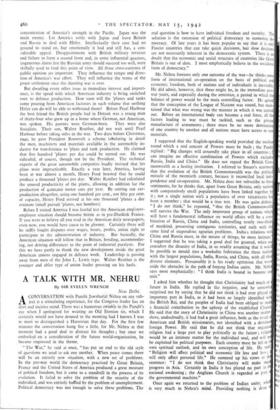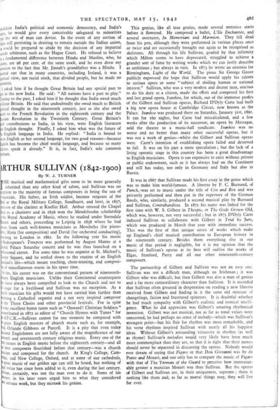A TALK WITH MR. NEHRU
By SIR EVELYN WRENCH New Delhi.
ACONVERSATION with Pundit Jawaharlal Nehru on any sub- ject is a stimulating experience, for the Congress leader has an alert and incisive mind. There was a humorous twinkle in the Pundit's eye when I apologised for wearing an Old Etonian tie, which I certainly would not have donned in the morning had I known I was to meet so distinguished a Harrovian that day. For the first few minutes the conversation hung fire a little, for Mr. Nehru at that moment had a good deal to distract his thoughts ; but once we embarked on a consideration of the future world-organisation, he became engrossed in the theme.
" The War," he said at once, " has put an end to the old style of questions we used to ask one another. When peace comes there will be an entirely new situation, with a new set of problems. In the pre-war world the democracy practised by Great Britain, France and the United States of America produced a great measure of political freedom, but it came to a standstill in the process of its evolution. It failed to solve the problem of the security of the individual, and was entirely baffled by the problem of unemployment. Political democracy was not enough to solve these problems. The
real question is how to have individual freedom and security. 'ph solution is the extension of political democracy to economic de mocracy. Of late years it has been popular to say that it is onl Fascist countries that can take quick decisions, but slow decision are not necessarily inherent in the democratic system. There is doubt that the economic and social structure of countries like Grea Britain is out of date. I most emphatically believe in the socialists form of democracy."
Mr. Nehru foresees only one outcome of the war—he thinks som form of international co-operation on the basis of political an economic freedom, both of nations and of individuals is inevitable He did admit, however, that there might be, in the immediate post war years, and especially during the armistice, a period in which th balance of power would be the main controlling factor. He agree that the conception of the League of Nations was sound, but main tained that what was wrong was the manner in which it was carry out. Before an international body can become a real force, all th factors leading to war must be tackled, such as the privat manufacture of armaments ; there must be no more dominatio of one country by another and all nations must have access to ra materials.
I suggested that the English-speaking world provided the nucleu round which a real concert of Powers must be built ; the Pundi replied : " Big changes will assuredly take place in all countries ; can imagine no effective combination of Powers which exclude Russia, India and China." He does not regard the British Com monwealth as a lasting institution. I referred to Smuts's statemen that the evolution of the British Commonwealth was the politica miracle of the twentieth century, because it reconciled local inde pendence and co-operation. Mr. Nehru does not subscribe to the sentiments, for he thinks that, apart from Great Britain, only nation with comparatively small populations have been linked together b: it ; not a single nation with a population of over roo,o33,opo ha been a member ; that would be a true test. He was quite definite " I do not think," he repeated, " that the British Commonweal will survive the War. The only important group of nations whit will have a fundamental influence on world affairs will be a corn bination of Russia, China and India, controlling nearly two-third of mankind, possessing contiguous territories, and each with th same kind of stupendous agrarian problems. India's relations wi China and Russia must, in the nature of things, be most intimate. I suggested that he was taking a good deal for granted, when on considers the disunity of India, in so readily assuming that it wou be possible to mould into a workable federation the three nation with the largest populations, India, Russia, and China, with all the diverse elements. Presumably it is his ready optimism that wave aside the obstacles in the path of forging Indian unity. Mr. Neh says most emphatically: " I think India is bound to become on unit."
I asked him whether he thought that Christianity had much of future in India. He replied in the negative, and he somewha surprised me by saying that he did not think it had ever played a important pan in India, as it had been so largely identified wit the British Raj, and the peoples of India had been obliged to mak a financial contribution to the upkeep of the established Churc He said that the story of Christianity in China was another matter there, undoubtedly, it had had a great influence, both as the result American and British missionaries, not identified with a domin foreign.. Power. He said that he did not think that organic religion had a large part to play politically in the future ; religio would be an intimate matter for the individual soul, and will a be exploited for political purposes. Each country must be left to l own spiritual outlook, and its own conception of life. He said " Religion will affect political and economic life less and less ; will only affect personal life." He summed up his views m sentence: " I do not think that Christianity will make muc progress in Asia. Certainly in India it has played no part in th national awakening ; the Anglican Church is regarded as Part the governmental machine."
Once again we returned to the problem of Indian unity, whi is very much in Nehru's mind. Providing nothing is done sedidate India's political and economic democracy, and India's orstr, he would give every conceivable safeguard to minorities tat the wit of man can devise. In the event of any section of bdia still persisting in desiring to remain outside the Indian union,
s would be prepared to abide by the decision of any impartial sside arbitrator, such as the Hague Court. He refused to believe s a fundamental difference between Hindu and Muslim, who, he s, are 98 per cent, of the same stock, and he even drew my cation to the fact that Mr. Jinnah's grandfather was a Hindu. I ed out that in many countries, including Ireland, it was a mal view, not racial stock, that divided people, but he made no ment.
I asked him if he thought Great Britain had any special part to in the new India. He said: " All nations have a part to play." uming to the past, I asked him if he thought that India owed much Great Britain. He said that undoubtedly she owed much to British Mical thought in the nineteenth century, just as she also owed h to the French Revolution in the eighteenth century and the sian Revolution in the Twentieth Century. Great Britain's f contributions to India, in his view, were English literature English thought. Finally, I asked him what was the future of English language in India. He replied: " India is bound to In English as her second language, for two good reasons—because lista has become the chief world language, and because so many tans speak it already." It is, in fact, India's sole common UM.



























 Previous page
Previous page